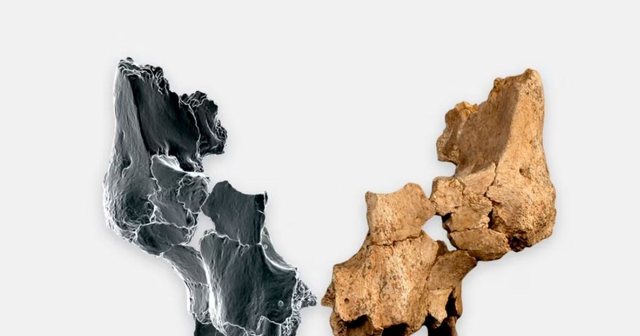
Archaeologists discover fossilized human face part dating back over 1 million years


Part of a fossilized face from a human ancestor is the oldest found in Western Europe, according to archaeologists.
The incomplete skull, part of the left cheekbone and upper jaw, was found in northern Spain in 2022. The fossil is believed to be between 1.1 million and 1.4 million years old, according to research published in the journal Nature.
"The fossil find is exciting," said Eric Delson, a paleontologist at the American Museum of Natural History, who was not involved in the study. "It's the first time we've found significant fossils older than 1 million years in Western Europe."
A collection of the oldest fossils of early human ancestors has been previously found in Georgia, near the crossroads of Eastern Europe and Asia. The fossils are estimated to be 1.8 million years old.
The partial skull found in Spain is the first evidence that clearly shows that human ancestors were "moving toward Europe" at that time, said Rick Potts, director of the Human Origins Program at the Smithsonian Museum.
But there is still no evidence that the earliest arrivals continued there for long, he said. “They could have arrived in a new place and then died,” said Mr. Potts, who had no role in the study.
The partial skull has many similarities to the human species Homo erectus, but there are also some anatomical differences, said study co-author Rosa Huguet, an archaeologist at the Catalan Institute of Human Paleoecology and Social Evolution in Tarragona, Spain.
The Homo erectus species is believed to have lived about 2 million years ago and moved from Africa to regions of Asia and Europe, with the last individuals dying out about 100,000 years ago, Mr Potts said.
It can be very difficult to identify which group of early humans a fossil find belongs to if there is only a single fragment versus many bones that show a range of characteristics, said University of Zurich paleoanthropologist Christoph Zollikofer, who was not involved in the study.
The same cave complex in Spain's Atapuerca Mountains where the new fossil was found has previously provided other significant clues about the ancient human past. Researchers working in the region have also found more recent fossils of Neanderthals and early Homo sapiens.

Scandal erupts: Poll against SPAK intercepted!
ideas

Illiteracy of Politics

Don't make fun of Berisha's old age, but of his dream of becoming a groom again.

top
Alfa recipes
TRENDING 
services
- POLICE129
- STREET POLICE126
- AMBULANCE112
- FIREFIGHTER128
























